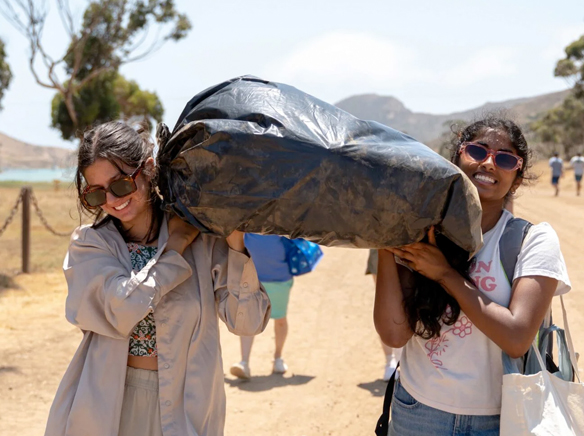
Courtesy USC Sea Grant
The University of Southern California (USC) Sea Grant Program was awarded nearly $2 million from the National Oceanic and Atmospheric Administration (NOAA) to develop a disruptive and sustainable method for upcycling ocean-bound plastic waste across Southern California waterways, and to investigate the psychology behind eco-conscious choices.
The multi-disciplinary project team, which will be co-led by the USC Wrigley Institute for Environment and Sustainability (WIES), will collect local marine microplastics and other plastic trash, and leverage a new hybrid chemical/biological approach to recapture the carbon and energy embedded in these waste materials. Using this novel process, the materials will be converted into high-value molecules and biomaterials to produce dyes for eco-friendly fashion and enzymes for sustainable laundry detergents.
This part of the project will be spearheaded by Clay C.C. Wang, chair and professor of pharmacology and pharmaceutical sciences at the USC Mann School of Pharmacy and Pharmaceutical Science; Travis J. Williams, professor of chemistry at the USC Dornsife College of Letters, Arts, and Sciences; and Richard W. Roberts, professor of chemical engineering and materials science at the USC Viterbi School of Engineering.
“We’re harnessing the power of nature to convert trash accumulating in our world’s oceans, such as microplastics and fishing lines, into useful products,” Wang says. “We aim to develop sustainable, scalable methods. This technology can initially be translated to commercial partners on a pilot scale, and later scaled up for commercial-level production.”
Equally important as the biotechnology, the project will also examine social barriers to consumer adoption of such trash-derived products and familiarize public audiences with these emerging technologies through an integrated educational outreach program. This work will be led by Joe Árvai, director of the Wrigley Institute and a professor of psychology, biological sciences, and environmental studies. He has helmed related research on consumer acceptance for end products of other emerging mitigation technologies, including carbon capture.
“When it comes to marine debris, it’s not enough to point to the problem and then hope it goes away,” says Árvai. “We need to identify approaches that will keep marine debris from entering the ecosystem in the future. And we need to simultaneously develop approaches that make the existing debris a value-added resource. It’s this value creation that will help to incentivize a necessary present-day clean-up. And that’s what our innovative and timely project sets out to do.”
Co-investigator Karla Heidelberg, director of USC Sea Grant and professor of the practice of biological sciences and environmental studies, will lead the outreach and education initiatives on environmental plastics. Working with the USC Sea Grant team, she will provide resources and critical strategic partnerships with municipalities and local non-profits, such as Heal the Bay and the Cities of Los Angeles and Avalon, located on Santa Catalina Island.
The ubiquity of plastic in today’s culture has contributed to it being one of the most serious ocean pollution issues of the 21st century. NOAA, USC Sea Grant, and WIES are addressing the issue of marine debris along many points in the plastic cycle, including prevention. For plastic that has already reached the ocean environment, it is critical to find solutions to remove and repurpose it before it breaks down into microplastics and spreads throughout ocean ecosystems and marine life.
“Sea Grant is excited to be part of an interdisciplinary project that has such immediate and beneficial applications of the research,” says Heidelberg. “In addition, we are excited to partner with municipalities and local nonprofits, such as Heal the Bay, on public education and acceptance.”
This joint USC Sea Grant-Wrigley Institute project is one of 21 awarded through the Marine Debris Challenge and Community Action Coalitions competitions, a $27 million investment from NOAA to prevent and remove marine debris in coastal and Great Lakes communities with support from the Bipartisan Infrastructure Law. While some of these projects will push the boundaries of existing marine debris prevention and removal technologies and approaches, and turn innovative research into tangible results, other projects will engage communities, groups, and localities — particularly those that have been historically underserved — in translating research into collaborative marine debris removal and prevention efforts.
The USC Sea Grant Program is part of a national Sea Grant network consisting of federal-university partnerships between NOAA and 34 university-based programs in every coastal and Great Lakes state, Puerto Rico, and Guam. USC Sea Grant is administered within the USC Wrigley Institute for Environment and Sustainability, which is housed in the USC Dana and David Dornsife College of Letters, Arts, and Sciences.










